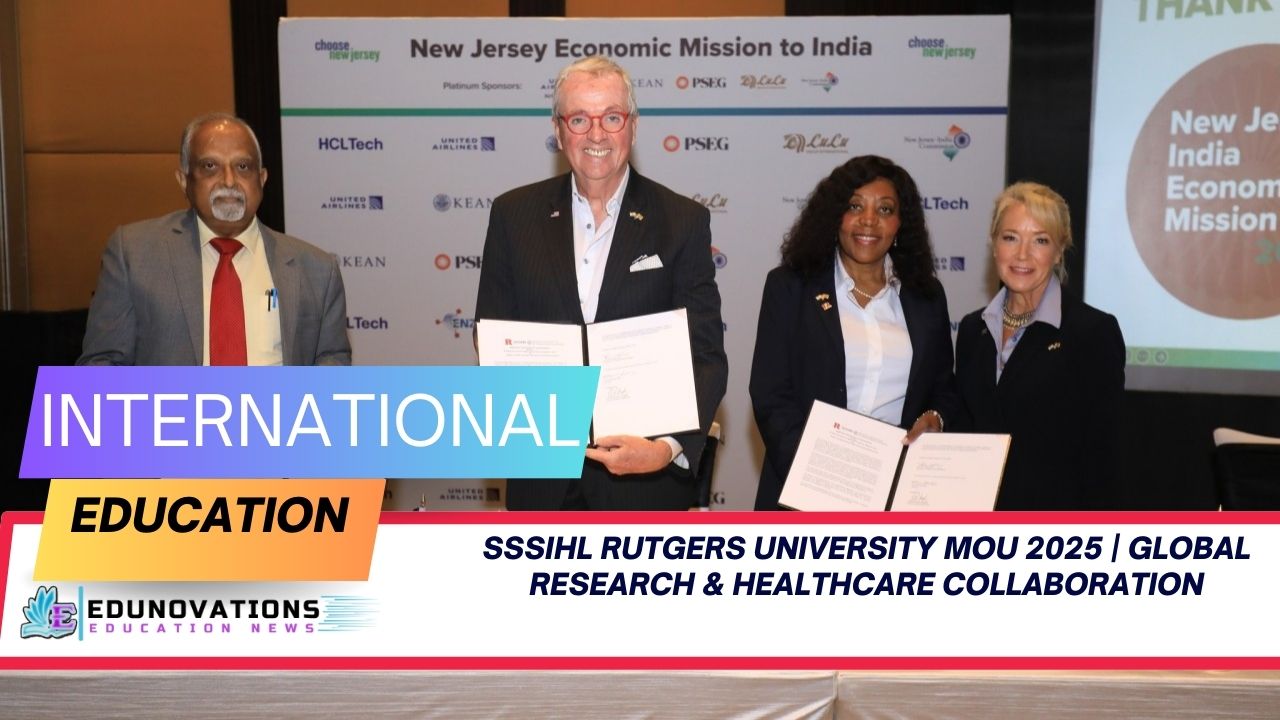Explore the SSSIHL Rutgers University MoU 2025 advancing research, AI in healthcare, digital health initiatives, and global academic collaborations.
Sri Sathya Sai Institute of Higher Learning (SSSIHL) has officially signed a landmark SSSIHL Rutgers University MoU 2025, marking a significant milestone in international academic collaboration. This agreement with Rutgers University, USA, and Sri Sathya Sai Institute of Higher Medical Sciences (SSSIHMS) aims to propel cutting-edge research in healthcare, AI, and translational science, offering students and faculty unparalleled global exposure.
Strengthening Research through International Collaboration
Under the terms of the SSSIHL Rutgers University MoU 2025, the institutions will collaborate on joint research projects, faculty exchanges, and knowledge-sharing workshops. The initiative emphasizes AI in healthcare research SSSIHMS collaboration, leveraging artificial intelligence to improve diagnostics, treatment planning, and patient care outcomes. According to global studies, AI-powered healthcare solutions are projected to grow at a CAGR of over 40% by 2030, making this collaboration timely and transformative.
Key Areas of Focus
- Translational Science Initiatives
The MoU highlights SSSIHL translational science research partnerships aimed at converting laboratory discoveries into real-world medical applications. This will accelerate the adoption of innovative treatments and medical devices in hospitals across India and the United States. - Digital Health Innovations
By integrating digital health initiatives SSSIHMS Rutgers, both institutions aim to pioneer telemedicine platforms, wearable health monitoring devices, and AI-driven patient management systems. Digital healthcare adoption is increasing by 25% annually, demonstrating the relevance of this collaboration. - Global Academic Partnerships
The MoU fosters global academic collaboration SSSIHMS SSSIHL, encouraging student exchange programs, international joint conferences, and cross-border research publications. Experts anticipate that these collaborations will enhance SSSIHL’s global footprint in higher education.
Expert Insights on the MoU
Dr. Priyam Verma, a renowned biomedical researcher, commented, “This MoU paves the way for integrating AI in healthcare at a scale that can transform patient outcomes. Collaborative research across borders strengthens both academic and clinical expertise.”
Professor Anjali Rao, Head of Research at SSSIHMS, stated, “The SSSIHL Rutgers University MoU 2025 reflects our commitment to excellence in translational science and digital health initiatives, ensuring our students and faculty are at the forefront of global innovations.”
Educational and Career Opportunities
The MoU also provides students with international internships, exposure to advanced research laboratories, and collaborative workshops. Students will gain hands-on experience in AI-driven healthcare solutions, digital health platforms, and global research methodologies.
- Faculty Exchange Programs: Enhance teaching and research expertise.
- Joint Research Publications: Co-author high-impact papers in international journals.
- Global Workshops & Seminars: Exposure to cutting-edge technologies in healthcare and AI.
Linking Knowledge Across Platforms
For students seeking deeper insights, internal resources like NCERT Courses, Current Affairs, and NCERT Notes provide essential learning materials. For practical exercises, MCQs and Videos reinforce applied knowledge. Students can also access NCERT Mind Maps and Free PDFs for comprehensive preparation.
Social Impact and Healthcare Advancement
Beyond education, the MoU addresses societal needs by promoting innovations in patient care and public health. SSSIHMS, known for its excellence in healthcare, will implement AI-driven screening programs, telemedicine consultations, and digital patient records, benefiting rural and underserved communities.
Future Prospects
The SSSIHL Rutgers University MoU 2025 is expected to catalyze multiple joint research grants, international patents, and cross-institutional PhD programs. The collaboration positions SSSIHL as a global hub for translational research and digital healthcare innovations.
Benefits for Stakeholders
- Students: Gain exposure to global research methodologies and AI healthcare tools.
- Faculty: Engage in high-impact translational science projects and international collaborations.
- Healthcare Institutions: Access to advanced digital health tools and joint clinical research insights.
Conclusion
The signing of the SSSIHL Rutgers University MoU 2025 signifies a forward-looking commitment to excellence in research, healthcare innovation, and global academic collaboration. By fostering AI integration in medical sciences, digital health initiatives, and translational science partnerships, this MoU sets a benchmark for future international educational and medical collaborations.
Toppers Use Mind Maps to score more than 95%
NCERT Class 11th Commerce Mind Maps
Add to cartOriginal price was: ₹999.00.₹199.00Current price is: ₹199.00.NCERT Class 12th Chemistry Mind Maps
Add to cartOriginal price was: ₹199.00.₹75.00Current price is: ₹75.00.NCERT Class 12th Commerce Mind Maps
Add to cartOriginal price was: ₹999.00.₹199.00Current price is: ₹199.00.NCERT Class 12th Science Mind Maps
Add to cartOriginal price was: ₹999.00.₹199.00Current price is: ₹199.00.NCERT Mind Maps For Class 10th
Add to cartOriginal price was: ₹999.00.₹199.00Current price is: ₹199.00.
Purchase Today
FAQs
- What is the SSSIHL Rutgers University MoU 2025 about?
It is a collaborative agreement focusing on research, AI in healthcare, and translational science. - How does the MoU support AI in healthcare research SSSIHMS collaboration?
By integrating AI-driven diagnostics, treatment planning, and patient care initiatives. - What are the benefits of SSSIHL translational science research partnerships?
These partnerships convert laboratory discoveries into practical medical solutions. - How do digital health initiatives SSSIHMS Rutgers help students?
They provide hands-on experience with telemedicine, wearable devices, and AI-based patient monitoring. - What global academic collaboration SSSIHMS SSSIHL opportunities exist?
Student exchanges, joint research publications, and international workshops. - Who are the key experts involved in this MoU?
Dr. Priyam Verma and Professor Anjali Rao, among others, guide research and AI integration. - How does the MoU impact rural healthcare?
Through telemedicine programs and AI-driven patient management systems in underserved areas. - Can faculty participate in international research under this MoU?
Yes, faculty can join collaborative projects and publish in high-impact international journals. - Are there career opportunities linked to this MoU?
Yes, students gain internships, workshops, and exposure to AI and digital health projects. - Where can students find related educational resources?
Internal resources include NCERT Courses, MCQs, and Notes.














